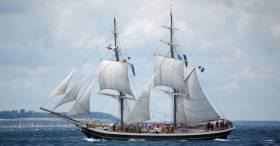Displaying items by tag: Maybe
Tall Ship Sailing Chance Between Irish & Scottish Ports
Anyone aged between 16 and 28 who would like to sail aboard a Tall Ship is being offered the opportunity by Belfast City Council and Sail Training Ireland. As Afloat.ie previously reported, The Tall Ships, “Maybe” and “Morgenster” are the vessels on which voyages between Belfast, Scottish and Irish ports, will be available, as part of Belfast’s Maritime Festival. Applications are invited with a deadline of Friday, March 25.
Sail Training Opportunities In 2016
#TallShips - Sail Training Ireland has announced details of its tall ships voyages for youth sailors in 2016.
Three voyages are scheduled on board the 46m brig Morgenster in May and June – Cork to the Netherlands for under-18s (calling at Waterford and Wales), Belfast to Cork for over-18s (calling at the Isle of Man and Dublin) and an open delivery voyage from the Netherlands to Belfast.
Smaller crews will be welcomed on board the Dutch ketch Maybe for a series of 11-day voyages from April to June under the Leargas Youth Exchange programme for under-18, taking in Oban in Scotland, Belfast, Galway, Dublin and ports between.
In addition, the two established bursary schemes for young people in Ireland will hold their own voyages this summer, with the Drogheda Bursary Scheme scheduling two short adventure sailing trips on board the Spirit of Oysterhaven (Waterford–Drogheda and Drogheda–Derry), and the Cork Bursary Scheme sending participants on the same 70ft classic schooner around the South West.
During these five-day excursions young people will learn about the maritime environment, develop their sailing skills and challenge themselves both physically and mentally.
In addition, the 70ft ketch Brian Boru will embark on five discovery voyages for under-18s and over-18s between Waterford, Dublin and Drogheda beginning in March.
Places on these voyages are limited and expensive, but come part-funded thanks to local and European bursary schemes, individuals and sponsoring organisations, topped up by donations raised by each trainee.
Sail Training Ireland has more on its 2016 sailing training voyages HERE.
























































